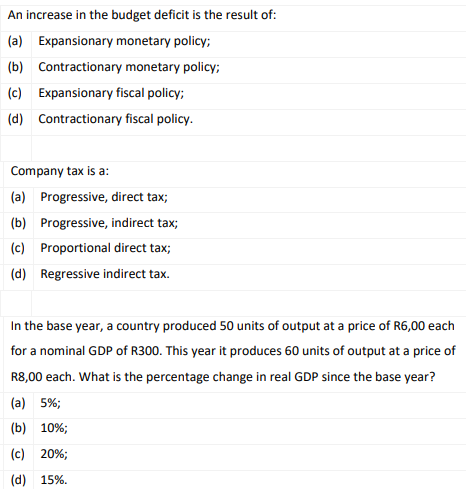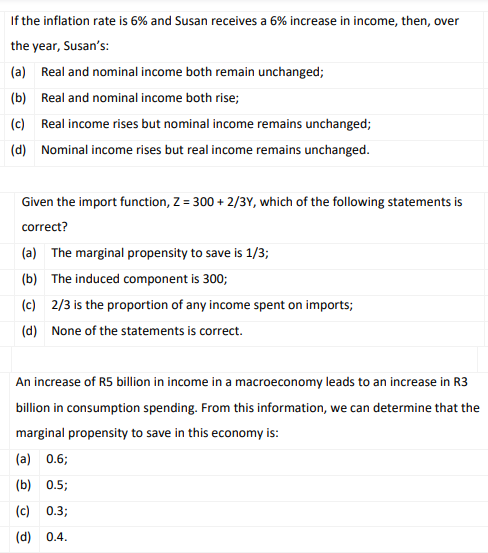An increase in the budget deficit is the result of: (a) Expansionary monetary policy; (b) Contractionary monetary policy; (c) Expansionary fiscal policy; (d) Contractionary fiscal policy.
An increase in the budget deficit is the result of: (a) Expansionary monetary policy; (b) Contractionary monetary policy; (c) Expansionary fiscal policy; (d) Contractionary fiscal policy.
Brief Principles of Macroeconomics (MindTap Course List)
8th Edition
ISBN:9781337091985
Author:N. Gregory Mankiw
Publisher:N. Gregory Mankiw
Chapter12: Money Growth And Intlation
Section: Chapter Questions
Problem 6PA
Related questions
Question

Transcribed Image Text:An increase in the budget deficit is the result of:
(a) Expansionary monetary policy;
(b) Contractionary monetary policy;
(c) Expansionary fiscal policy;
(d) Contractionary fiscal policy.
Company tax is a:
(a) Progressive, direct tax;
(b) Progressive, indirect tax;
(c) Proportional direct tax;
(d) Regressive indirect tax.
In the base year, a country produced 50 units of output at a price of R6,00 each
for a nominal GDP of R300. This year it produces 60 units of output at a price of
R8,00 each. What is the percentage change in real GDP since the base year?
(a) 5%;
(b) 10%;
(c) 20%;
(d) 15%.

Transcribed Image Text:If the inflation rate is 6% and Susan receives a 6% increase in income, then, over
the year, Susan's:
(a) Real and nominal income both remain unchanged;
(b) Real and nominal income both rise;
(c) Real income rises but nominal income remains unchanged;
(d) Nominal income rises but real income remains unchanged.
Given the import function, Z = 300 + 2/3Y, which of the following statements is
correct?
(a) The marginal propensity to save is 1/3;
(b) The induced component is 300;
(c) 2/3 is the proportion of any income spent on imports;
(d) None of the statements is correct.
An increase of R5 billion in income in a macroeconomy leads to an increase in R3
billion in consumption spending. From this information, we can determine that the
marginal propensity to save in this economy is:
(a) 0.6;
(b) 0.5;
(c) 0.3;
(d) 0.4.
Expert Solution
This question has been solved!
Explore an expertly crafted, step-by-step solution for a thorough understanding of key concepts.
This is a popular solution!
Trending now
This is a popular solution!
Step by step
Solved in 2 steps

Knowledge Booster
Learn more about
Need a deep-dive on the concept behind this application? Look no further. Learn more about this topic, economics and related others by exploring similar questions and additional content below.Recommended textbooks for you

Brief Principles of Macroeconomics (MindTap Cours…
Economics
ISBN:
9781337091985
Author:
N. Gregory Mankiw
Publisher:
Cengage Learning

Essentials of Economics (MindTap Course List)
Economics
ISBN:
9781337091992
Author:
N. Gregory Mankiw
Publisher:
Cengage Learning

Principles of Economics 2e
Economics
ISBN:
9781947172364
Author:
Steven A. Greenlaw; David Shapiro
Publisher:
OpenStax

Brief Principles of Macroeconomics (MindTap Cours…
Economics
ISBN:
9781337091985
Author:
N. Gregory Mankiw
Publisher:
Cengage Learning

Essentials of Economics (MindTap Course List)
Economics
ISBN:
9781337091992
Author:
N. Gregory Mankiw
Publisher:
Cengage Learning

Principles of Economics 2e
Economics
ISBN:
9781947172364
Author:
Steven A. Greenlaw; David Shapiro
Publisher:
OpenStax

Exploring Economics
Economics
ISBN:
9781544336329
Author:
Robert L. Sexton
Publisher:
SAGE Publications, Inc

